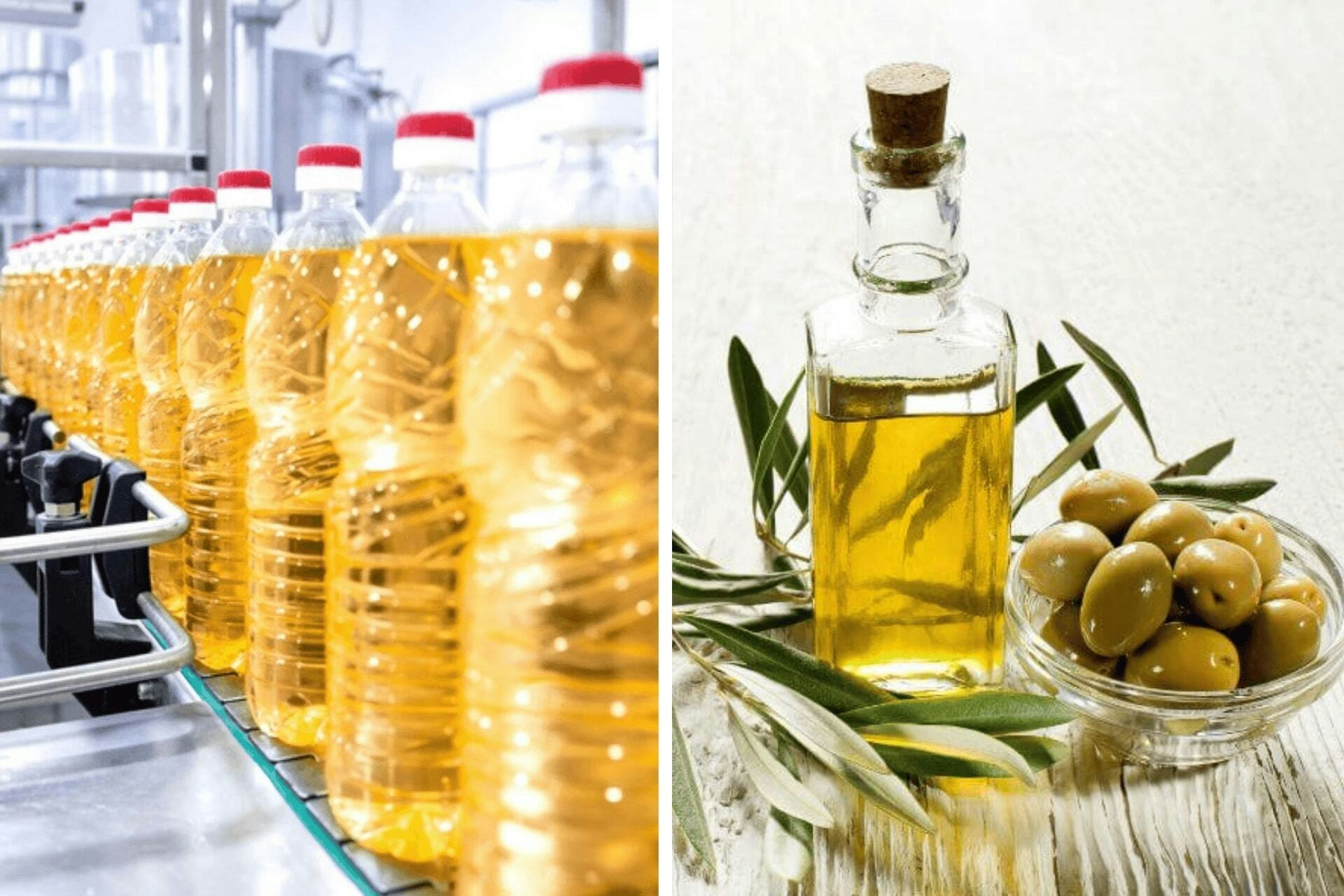Your oil could be sabotaging your healthy meals. Even the freshest veggies and leanest proteins lose their health edge if they’re cooked in the wrong oil. That’s because some oils break down under heat, forming harmful compounds — or they’re heavily processed in ways that strip away nutrients.
If you care about what goes into your body (and onto your plate), it’s worth taking a closer look at the cooking oils you use. In this article, you’ll learn the key factors that make an oil healthy, and the three best oils that check all the right boxes.
What Makes a Cooking Oil Healthy?
When choosing a cooking oil, it’s not just about flavor — it’s about what happens to that oil inside your body and your pan. A healthy cooking oil is made up of good fats, processed in a way that retains nutrients, holds up well under heat, and stays stable over time.
Let’s break that down:
Types of Fats
Unsaturated fats are generally considered heart-healthy. These include:
- Monounsaturated fats (MUFAs): MUFAs can help reduce LDL (“bad”) cholesterol and support insulin sensitivity ❶.
- Polyunsaturated fats (PUFAs): These include omega-3 and omega-6 fatty acids, which the body needs but can’t produce on its own. Omega-3s, in particular, are known for their anti-inflammatory benefits and have been linked to reduced risk of heart disease
- Saturated fats: Should be consumed in moderation. While some recent studies have challenged older views linking saturated fats to heart disease, most health organizations, including the American Heart Association, still recommend limiting them and favoring unsaturated fats ❷.
- Trans fats: Whether naturally occurring or artificially produced — are best avoided altogether. Industrial trans fats, which can be found in many processed foods and fried items, raise LDL cholesterol and lower HDL (“good”) cholesterol ❸.
Related: How to Choose Heart-Healthy Oils for Home Cooking
Processing Method
Unrefined oils are often labeled “cold-pressed,” “virgin,” or “expeller-pressed.” These are made without high heat or harsh chemicals, which helps preserve more nutrients like antioxidants and vitamins. They also keep more of their natural flavor. These oils are best for low or medium heat cooking, or for drizzling over finished dishes.
Refined oils, on the other hand, go through extra steps like bleaching or deodorizing. This removes strong smells and flavors, extends shelf life, and makes the oil better for high-heat cooking. However, the refining process can reduce some of the oil’s nutrients ❹.
Related: Refined vs. Unrefined Oil: What’s the Difference?
Smoke Point
The smoke point is the temperature at which oil starts to burn, break down, and smoke. When that happens, it loses nutrients, tastes bitter, and creates free radicals, which can trigger inflammation and stress in your body.
Oils with a high smoke point stay stable at high temperatures, making them safer and healthier for cooking methods like stir-frying, roasting, or deep-frying. They won’t break down or release toxins as easily, so your meals stay tasty and better for you.
Related: Cooking Oil Smoke Points and Their Applications
Oxidative Stability
An oil’s oxidative stability — how well it resists breaking down when exposed to heat, air, or light — is just as important as smoke point. Oils that are unstable oxidize more quickly, which makes them go rancid or release toxins when cooked.
Oils high in monounsaturated fats and naturally rich in antioxidants tend to be more stable. On the other hand, oils high in polyunsaturated fats, such as corn, soybean, or sunflower oil, are more prone to oxidation, especially when used at high temperatures ❺.
Healthiest Oils to Cook With and How to Use Them
Now that you’ve got the basics down — healthy fat content, minimal processing, heat tolerance, and stability — here are three oils that excel in all those areas:
Algae cooking oil
Algae cooking oil might be newer to the scene, but it’s quickly becoming a favorite among health-conscious home cooks and professional chefs alike. It’s expeller-pressed from natural algae — a sustainable source. Unlike some oils that require heavy refining or chemical solvents, expeller pressing uses mechanical pressure to extract the oil without compromising quality.
Rich in monounsaturated fats (specifically omega-9 fatty acids), algae cooking oil supports heart health and reduces inflammation. It’s also naturally low in saturated fat — lower than olive or avocado oil. With a smoke point of 535°F (279°C), one of the highest of all cooking oils, it’s incredibly stable and ideal for high-heat cooking methods.
You can algae cooking oil for virtually any cooking method — high-heat sautéing, grilling, or even baking. Its clean, neutral flavor also makes it a great base for dressings, marinades, and sauces where you don’t want the oil to overpower the dish.
Related: 6 Health Benefits of Algae Oil
Extra virgin olive oil
Extra virgin olive oil (EVOO) is a staple of the Mediterranean diet, and is celebrated for both its rich flavor and impressive health benefits. It is unrefined and cold-pressed from the first pressing of fresh olives. This gentle extraction process helps preserve the oil’s natural antioxidants and nutrients.
EVOO is high in monounsaturated fats, which has been linked to lower LDL (bad) cholesterol and reduced inflammation. It also contains beneficial polyphenols and vitamin E, both of which support heart health and help protect cells from oxidative damage.
Extra virgin olive oil is ideal for salad dressings, drizzling over cooked vegetables, or finishing dishes to add flavor.
Related: The Best Olive Oil Substitute and Other Alternatives
Avocado oil
Avocado oil is another nutrient-packed, versatile option for your kitchen. Typically extracted from the pulp of ripe avocados, avocado oil can be cold-pressed or refined. The unrefined version retains more nutrients, while refined avocado oil has a higher smoke point.
It’s loaded with monounsaturated fats, as well as lutein, an antioxidant that supports eye health. It also contains vitamin E and may help improve nutrient absorption from other foods ❻.
Refined avocado oil is perfect for stir-frying, roasting, and grilling. Unrefined versions, with their mild buttery flavor, work well in dressings, sauces, or as a finishing oil.
Related: The Best Avocado Oil Substitute and Other Alternatives
Unhealthiest Cooking Oils
Just as some oils can support your health, others may do more harm than good — especially when used frequently. Unhealthy cooking oils tend to be high in inflammatory fats, heavily refined, and unstable under heat, which can lead to the formation of harmful compounds during cooking.
Many of these oils are high in omega-6 polyunsaturated fats, which, while essential in small amounts, can promote inflammation when consumed in excess and out of balance with omega-3s.
Additionally, oils that are heavily processed often undergo chemical extraction, bleaching, and deodorizing, which strip them of nutrients and introducing chemical residues. Some even contain trans fats, which are strongly linked to heart disease and are now banned in many countries.
Here are some of the unhealthiest cooking oils to limit or avoid:
- Vegetable oil blends (often unlabeled combinations of low-quality oils)
- Soybean oil
- Corn oil
- Canola oil (especially when not cold-pressed)
- Cottonseed oil
- Sunflower oil (high-linoleic type)
- Safflower oil
- Palm oil (refined version)
- Margarine or shortening (due to trans fat content)
While convenience and affordability often make these oils appealing, switching to more stable, nutrient-rich options like algae, olive, or avocado oil is a simple change that can benefit you long-term.
Frequently Asked Questions
Still unsure about which oils are best for your kitchen? Here are answers to some common questions that come up when choosing cooking oils for health:
What is the healthiest oil to cook with?
The healthiest oil depends on how you plan to use it, but algae cooking oil stands out for several reasons. It’s rich in heart-healthy monounsaturated fats (omega-9s), has the highest smoke point of any cooking oil at 535°F, and is expeller-pressed, meaning it’s minimally processed and free from harmful chemicals.
Is coconut oil healthy?
Coconut oil is often marketed as a superfood, but its health benefits are mixed. It’s high in saturated fat, which can raise LDL levels in some people. However, it also raises HDL (good) cholesterol and contains medium-chain triglycerides (MCTs), which may offer some metabolic benefits. Use it occasionally rather than as your go-to.
Is butter healthy?
Butter is a natural fat, but like coconut oil, it’s high in saturated fat. It also contains conjugated linoleic acid (CLA) and vitamin A, which may offer minor health perks. However, regular consumption of butter, especially in large amounts or alongside a diet high in processed foods, may contribute to heart disease risk. If you enjoy butter, use it sparingly and pair it with a generally balanced, whole-food-based diet.
The Bottom Line
Choosing the right cooking oil doesn’t just influence the taste of your meals — it plays a powerful role in your long-term health. Focus on oils that are rich in good fats, minimally processed, and stable under heat, so you can cook with confidence and nourish your body.
Give Algae Cooking Club's chef-grade algae cooking oil a try. It’'s a small change that can make a big difference in how you cook and feel.




